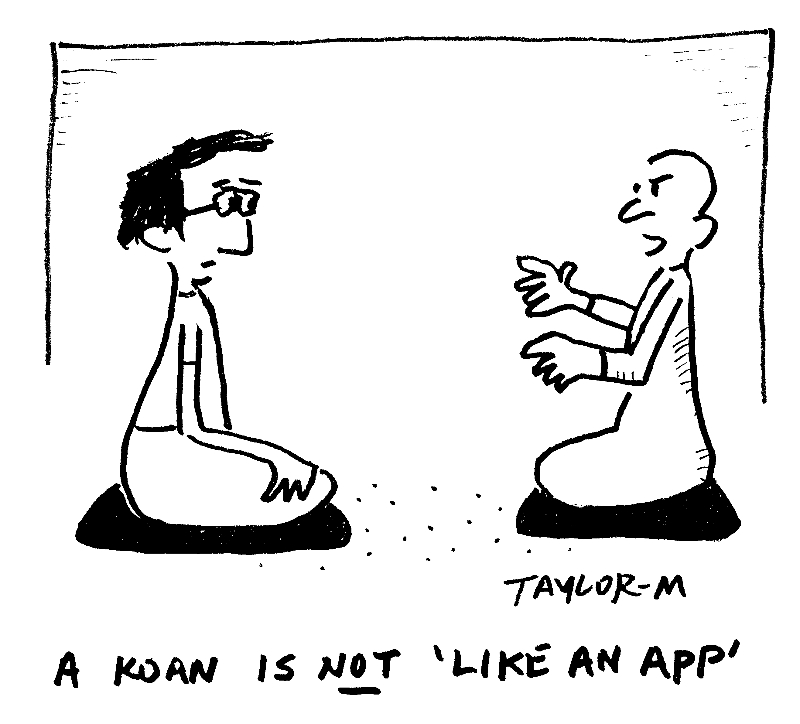(Meta)Physical Education is a series about the lessons that Alex Tzelnic, a Zen practitioner, has learned while teaching gym at a Montessori school. You can read more of Tzelnic’s stories here.

Speaking at a Montessori training college in 1931 at the invitation of Maria Montessori, Mahatma Gandhi said: “The greatest lessons in life, if we would but stoop and humble ourselves, we would learn not from grown-up learned men, but from the so-called ignorant children.”
Having been a Montessori gym teacher for the last eight years, I have stooped and I have humbled myself. I have bent my ear to the so-called ignorant children. I’m not sure if what I’ve heard counts as “the greatest lessons in life,” but kids are veritable walking koans, and I have taken it upon myself to collect their wisdom. Thus have I heard:
Case 7: Not This, Not That
One day, on the way out to recess, a teacher was walking next to Sadie, a second grader.
“Will you still be teaching here when my kids go to school?” Sadie asked.
“Oh, yeah, definitely,” the teacher answered.
“I’m going to have the record for the most amount of kids,” Sadie announced.
“Really?”
“Yeah. I’m going to have 18.”
“Wow,” the teacher said. “That’s a lot of kids.”
“You know how I know?”
“How?”
“Cause I already kissed a boy.”
This comment piqued the interest of Teddy, an eavesdropping classmate.
“Wait, you kissed someone?” he asked.
“Yeah,” said Sadie.
“Neighbor or cousin?” asked Teddy.
“What?” asked Sadie.
“Was it a neighbor or a cousin?” Teddy clarified.
What a silly question, the teacher thought. Children can be so ignorant, believing the world can be reduced to such simple binary choices.
“Neighbor,” answered Sadie.
Adults can be so ignorant, the teacher thought, believing the world must be unfathomably complex. He was humbled.
♦ ♦ ♦
Case 23: The Cross
A teacher stood in the hallway. Harold, a first grader, approached.
“Do you believe in God?” he asked loudly.
“Well, uh, that’s a complicated question,” the teacher stammered.
Harold leaned in closer. The teacher stooped and humbled himself.
“If you believe in God and you see the cross, you won’t die,” whispered the boy. “If you don’t believe in God and you see the cross—instant death.”
“Oh!” said the teacher. “Thank you for telling me.”
Harold left, and the teacher pondered his statement. Since he had seen many crosses he was happy to be alive, but also little bit confused since he didn’t consider himself a believer. Confusion is the mother of wisdom, and so the teacher was grateful for the opportunity to ponder this quandary.
♦ ♦ ♦
Case 37: The Ox
A teacher took a group of students roller-skating. This being 2016 and roller-skating being mostly passé, the students resembled Bambi on ice. One student in particular kept falling and bursting into tears and falling and bursting into more tears. The teacher tried to help her, advising her to use the wall to support herself, but with so many students struggling he felt like he was herding cats and couldn’t give her much attention.
Later, he went back to check on her, and she was creeping along the wall and remaining upright. No tears.
“How are you doing?” he asked.
“For some reason I wanted to be alone,” she said. “I don’t know why.”
“That’s interesting,” the teacher said.
“Oh I know!” said the girl, brightening. “Perhaps it’s because I was born in the year of the ox. And oxes like to be alone.”
The teacher admired the courage of the little ox. He realized that without struggle there can be no growth and also that the placemats at Chinese restaurants can be quite helpful.
♦ ♦ ♦
Case 54: Thought (Is Overrated)
A young student came up to a teacher at the school carnival.
“Would you like to buy some Girl Scout cookies?” she asked.
“Hmm,” said the teacher, looking for a way to avoid this financial commitment. “Let me think about it.”
“Okay,” the girl said and walked away.
The teacher was delighted by his superior intellect. How easy it is, he thought, to deflect children. Moments later the girl’s sister approached.
“Would you like to buy some Girl Scout cookies?” she asked.
“Hmm,” said the teacher, confident in his deflection skills, “Let me think about it.”
The girl stared at him, dumbfounded. “What is there to think about?” she asked.
The teacher had no answer. In the coming weeks, he pondered her wisdom every time he reached for another Caramel deLite.
♦ ♦ ♦
Case 72: The Meaning of Life
A teacher was leading a group of students down the hall. Another teacher was standing in the hallway talking to one of her students. She asked the student, “Do you have any questions?”
The first teacher was confused and thought she was talking to him. “Um, what is the meaning of life?” he asked.
“I don’t know,” said the other teacher. She turned to her student and asked, “What is the meaning of life?”
“I don’t know,” said the student. “Ask Lola.”
Lola was in the first teacher’s group. “What is the meaning of life?” he asked her.
“I don’t know. Ask Carl.”
“What is the meaning of life?” the teacher asked Carl.
“I don’t know. Ask Jamie.”
The question was thus passed down the line until it reached Hailey.
“What is the meaning of life?” he asked.
Hailey rose to the challenge: “Life is a big white butt that flies around and collides into everyone.”
No one could refute this point, and all who heard it experienced a deep awakening. Or at the very least, a minor giggle.
Read more from Alex Tzelnic’s series on the intersection of Buddhism and Montessori: